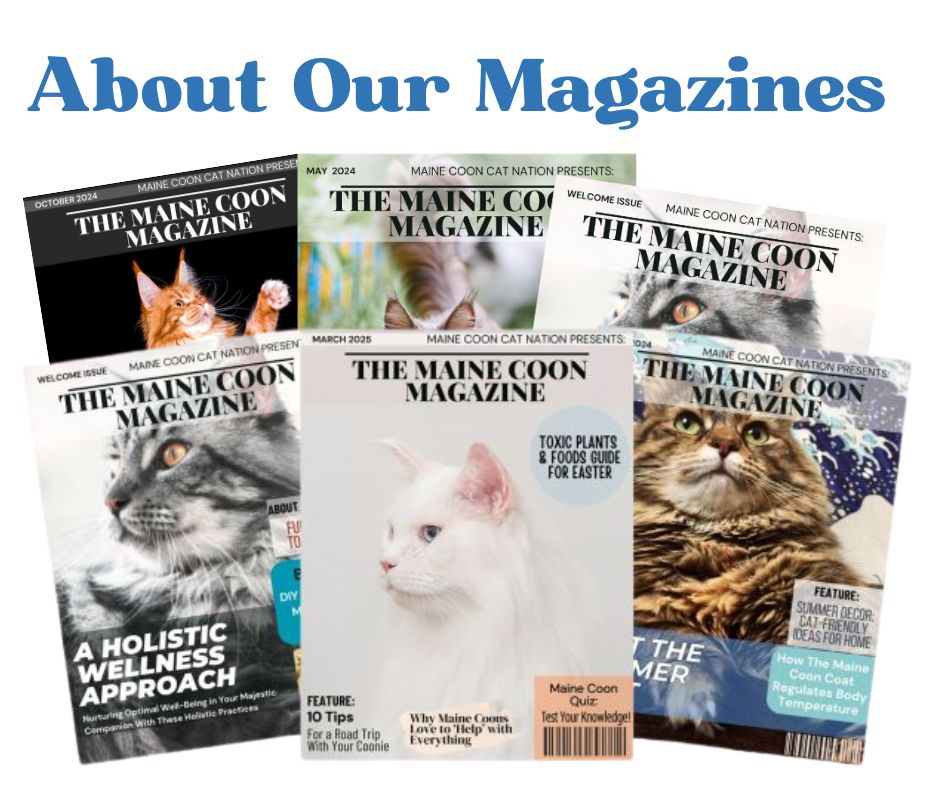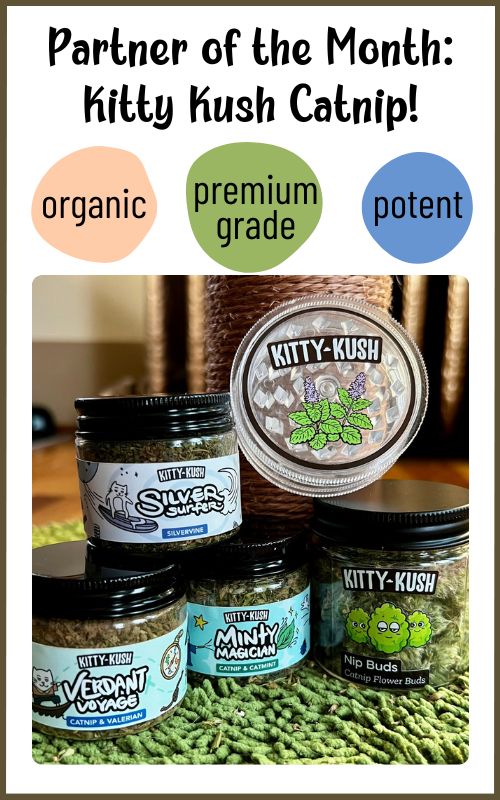- Home
- Maine Coon Cat Health
- Maine Coon Lifespan
The Maine Coon Cat Lifespan:
Factors for a Longer Life Expectancy
What is the Maine Coon cat lifespan? We all want our furry friends to live as long as possible, of course!
Because we love our gentle giants so much, the Maine Coon life expectancy is a concern.
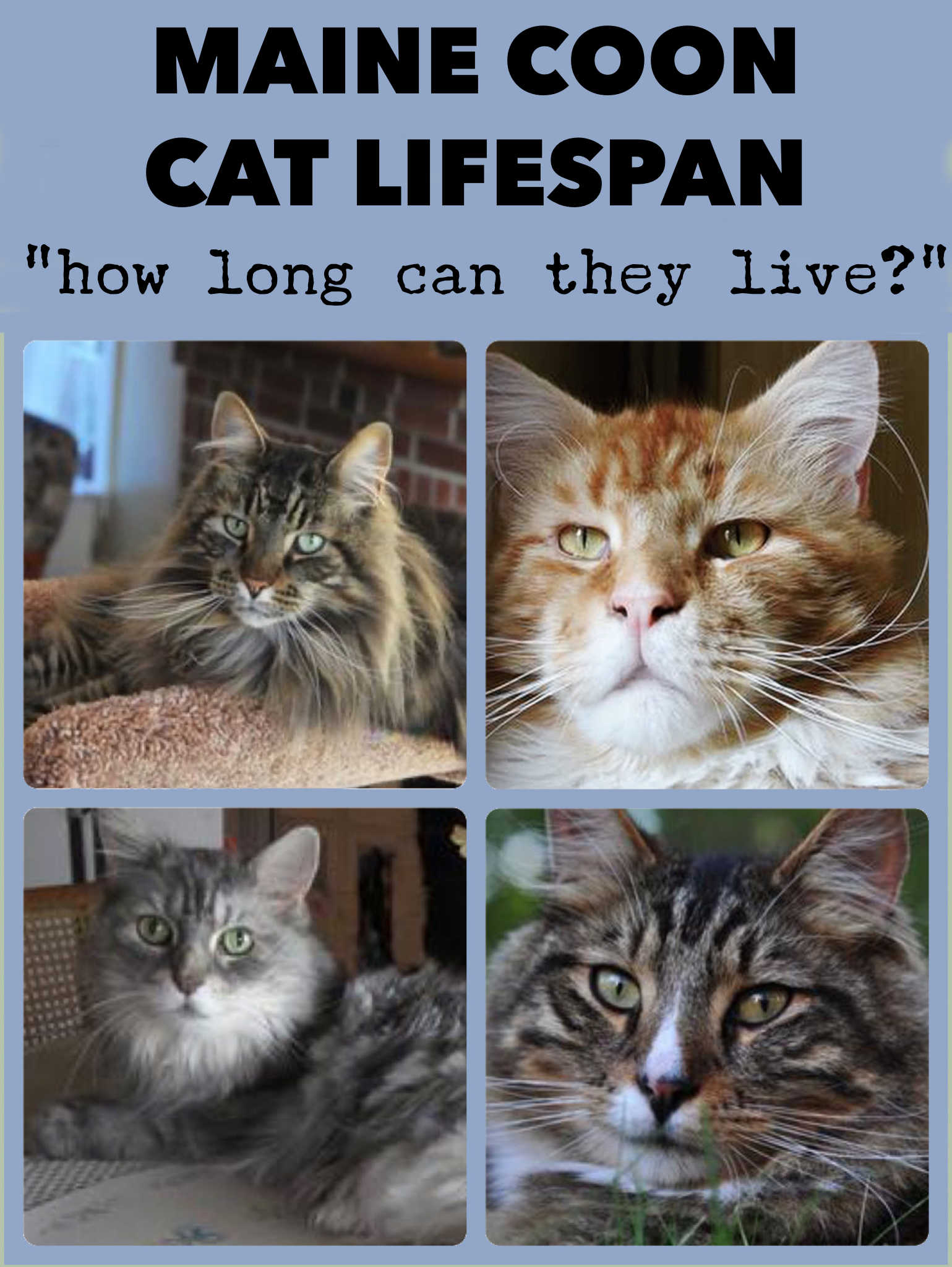 Maine Coon Cat Lifespan
Maine Coon Cat Lifespan~pin to save for later!~
The "textbook answer" is that the average Maine Coon lifespan is 12-15 years. Naturally, we all want our beloved Coonies to live as long as possible.
It's not uncommon for a Coonie to be posted in our Photo Galleries who is 15, 18 or even 20+ years old!
So let's talk about three key factors for a long and healthy life:
Table of Contents:
Health Considerations for Long Life:
They are generally a healthy breed. Even so, it's a good idea to know about some illnesses and genetic conditions that can affect a Maine Coon’s lifespan before scouting for available kittens.
In general, this is a robust and hardy breed of cat – they are strong and healthy!
This breed developed naturally, and these beautiful felines have big, strong bodies. Males may weigh 13-18 pounds, and a full size female may weigh in at about 9-12 pounds.
Both males and females can weigh substantially more on occasion! A gentle giant indeed.
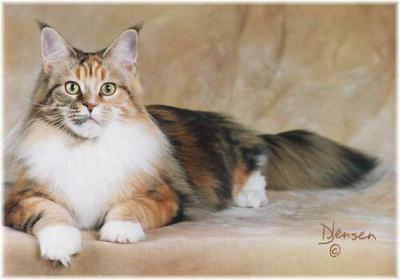 Torri
TorriEven the biggest specimens are not overweight, but normally proportioned.
As a large cat, there are health issues to be aware of.
The first health condition that comes to mind is hip dysplasia.
This genetic disorder results in a poorly fitting ball and socket of the hip joint.
Dogs and large size kitties will be more susceptible to the pain associated, since they bear more weight on the joint than a lightweight kitty. It impacts their quality of life.
Spinal muscular atrophy (SMA) is also a genetic disorder. It results in a loss of muscle tone in their hindquarters.
Polycystic kidney disease (PKD) is an inherited condition that causes cysts on the kidney, and can ultimately result in kidney failure.
HCM, or hypertrophic cardiomyopathy, is a bit more commonly known to pet owners. This genetic disease causes a thickening of the wall of the heart, gradually over time, tragically resulting in sudden heart failure.
Visit our page on these breed specific health problems for a more comprehensive look at each of these genetically inherited conditions that can shorten the Maine Coon cat lifespan.
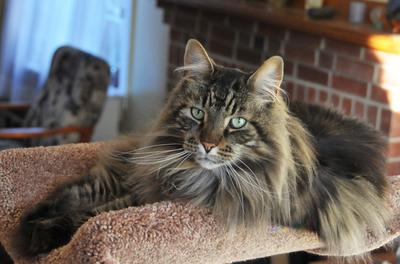 Little Bear
Little BearIf these health issues have you feeling apprehensive, take heart! Reputable breeders are very conscious of them.
There are genetic (DNA) tests, and screenings that can be done regularly, and are part of the breeding process.
There is no way to completely guarantee a kitty won't develop any of these health problems.
But by going to ethical and experienced Maine Coon breeders who screen and DNA test for genetic conditions, you can rest assured everything possible has been done to lower the chances.
A general health issue that affects many domestic cats, especially older ones, is periodontal disease.
Our page on feline oral health and caring for your cat's teeth talks all about what to look for, and what you can do. If left untreated, it can impact a Maine Coon cat's life expectancy.
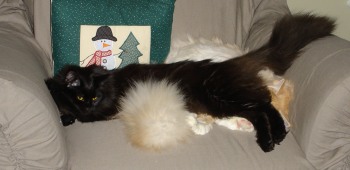 My Alice and Leo having a cuddle
My Alice and Leo having a cuddleLeo and Alice are the two Coonies who inspired this site. Leo lived to be 14, when he lost his battle with aggressive cancer.
A few years later we had to say goodbye to Alice at the nice old age of 17, also due to cancer. No matter how long they live, it's never long enough.
Maine Coon Cat Lifespan -
Indoors vs. Outdoors:
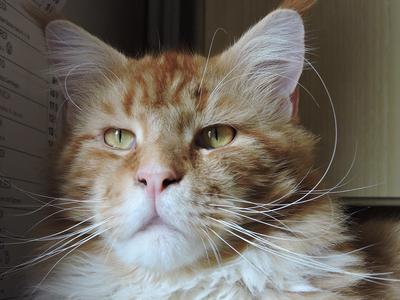 Zoran
ZoranThe biggest factor that pet parents have control over to extend their Maine Coon's lifespan is keeping them indoors!
Reasons To Keep Your Kitties Indoors:
1. So no harm comes to them, reducing the Maine Coon cat lifespan.
2. Because you (probably) agreed in writing with your breeder to do so.
It's really that simple! Our page on keeping your feline friend indoors has more specific info, reasons, tips and more.
Occasionally someone thinks that this is a "working breed," with a genetic predisposition to being "in the wild" or that it would be against their rough and tumble nature to keep them as house cats.
Nothing could be further from the truth!
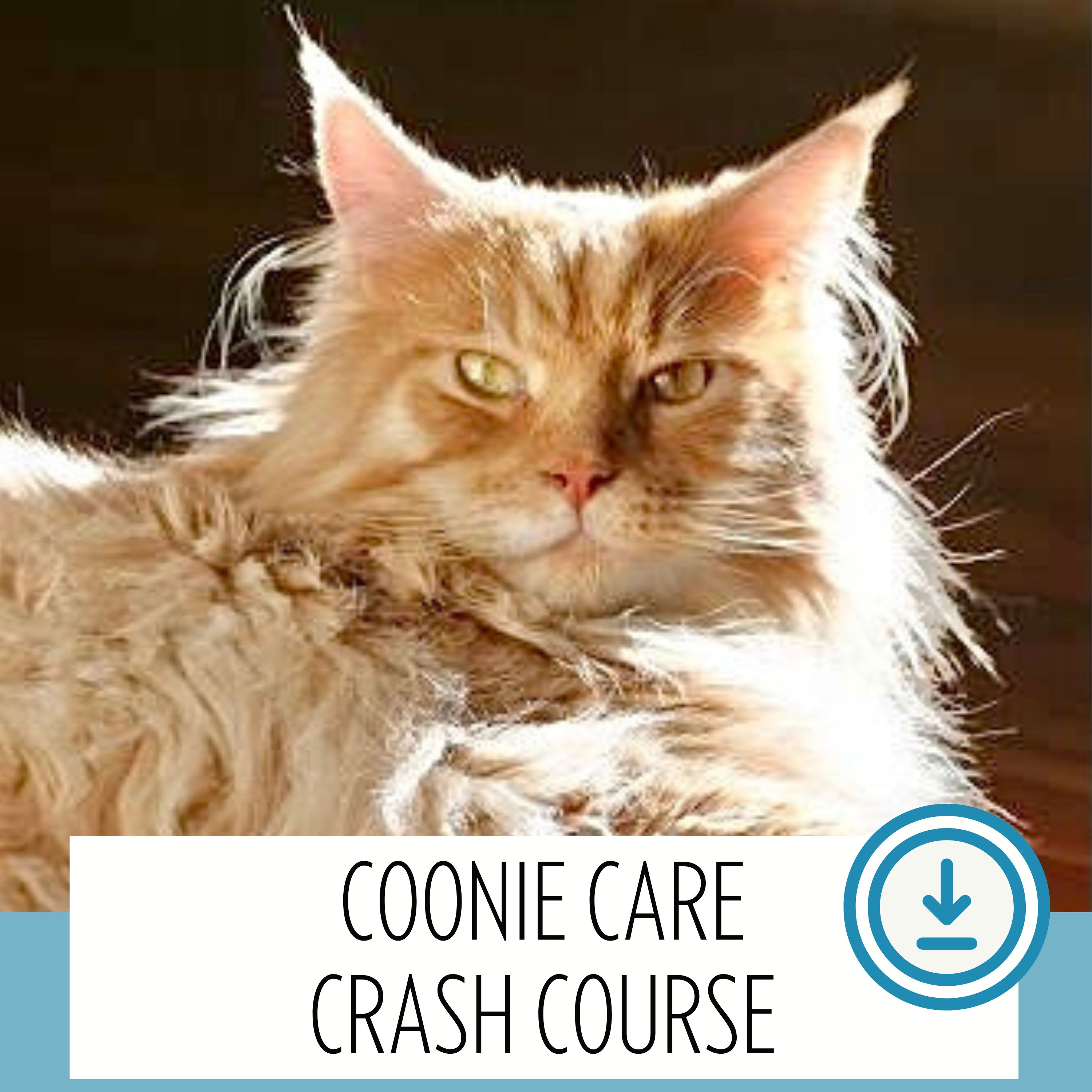
Vaccines For a Longer Lifespan
As indoor cats, some people believe that means they won't have to worry about vaccinations, but that's not true at all!
For a long lifespan, vaccinations are as essential for indoor cats as they are for outdoor ones.
Many believe that indoor cats are safe from illness, but even the coziest of indoor environments can't completely shield them from disease.
Viruses and bacteria can hitch a ride on our clothes, shoes, or through an open window. Vaccines are a crucial defense against illnesses like feline distemper, herpesvirus, and rabies.
Keeping up with vaccinations ensures your Coonie stays healthy and safe, providing peace of mind for you and a longer, happier life for your feline friend.
For example, feline distemper, also known as feline panleukopenia, is a highly contagious viral disease caused by the feline parvovirus.
Feline parvovirus can be transmitted via clothing on a visitor. The virus is incredibly resilient and can survive in the environment for a long time.
This means that if a person has come into contact with an infected cat or a contaminated area, the virus can hitch a ride on their clothes, shoes, or hands.
When they visit your home, they can inadvertently introduce the virus, posing a risk to your cat.
This is one reason why even indoor cats need to be vaccinated—to protect them from such indirect exposure to contagious diseases.
You can expect a long lifespan with your indoor Coonie(s)! As a large breed of cat they may look tough, but they are sweet, docile and prone to long naps.
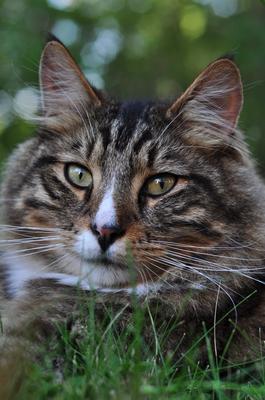 Baby
Baby"How can I take proper care of my indoor Coonie?"
Indoor kitties love a sturdy, big cat tree! Trees, sturdy scratching posts and toys are all these big kitties need for enough exercise.
Playing together is one of the best forms of quality time, too.
Also, they can be leash and harness trained for jaunts outside, which is fun!
Many Coonie owners are lucky enough to provide a catio or enclosed area for outdoor excursions as well.
Just bear in mind that this opens the door for ticks and fleas, so treatments may be in order.
Fact: Regardless of breed, the average life expectancy of outdoor cats is just 4-5 years. The more they go outside, the higher the chance they will encounter a dangerous or deadly threat.
That's how statistics work – the more often a pet is exposed to a risk, the higher the chance it'll happen.
Most owners will say that their indoor Coonie has an amazing quality of life, and plenty of mental stimulation.
They also have the peace of mind of knowing that their Maine Coon's lifespan will as long as it possibly can be.
Good Nutrition for a Long Maine Coon Cat Lifespan:
Pet parents often ask about a healthy diet and nutrition, especially for these large indoor cats.
Because dry food is more calorie dense, kitties on a diet of mainly dry kibble may end up on a weight loss plan!
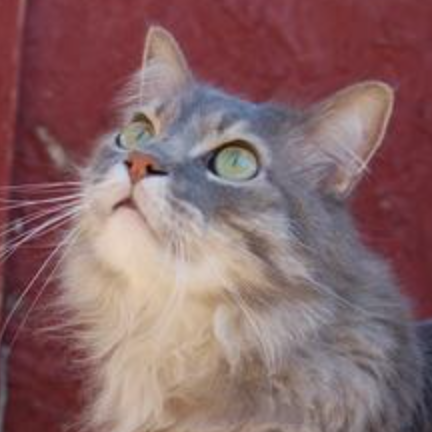 Pepper
PepperFeeding your indoor kitty a high protein diet is especially good for the Maine Coon Cat Lifespan.
Carbohydrates are more difficult to digest. Since felines are obligate carnivores, they do need a high protein diet.
A high protein diet is especially beneficial for senior cats. It will help keep them healthier, longer, extending their Maine Coon cat lifespan.
There are so many high quality pet foods on the market now. It's a good idea to ask your veterinarian for a recommendation.
Special formulas like senior food for elderly felines may help extend your senior pet's life expectancy.
The Importance of Playing Together:
Regular exercise together with fun cat toys will help keep your indoor kitty fit and healthy for a long life.
But did you know that the mental stimulation it provides also helps avoid elderly cat health problems like senility or dementia? The key to a long life!
To read stories and experiences from other Coonie lovers, check out this page in our Q & A section, where Joann asks about the Maine Coon cat lifespan and many folks have commented.
Tributes to some extra long-lived Coonies:
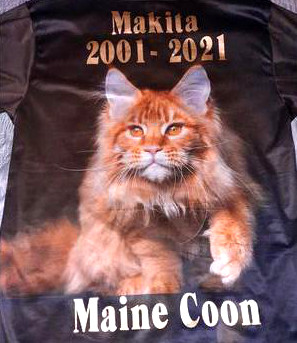
Lee in Michigan says that Makita was one of a kind. He lived a long, adventurous life of 20 years.
This guy was no ordinary kitty - he'd play and chase Lee like a dog, climb trees 80 feet tall and come down head first.
He wasn't afraid of water either - he'd jump into the swimming pool, shower, and even the pond!
Lee has many amazing stories and memories with Makita. He was one special feline.
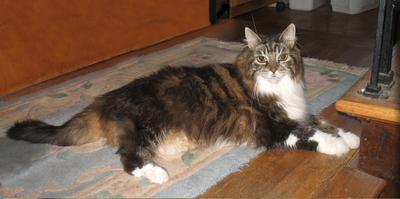 Amber
AmberTerry in NY shares her tribute to Amber:
She says Amber was such a special cat. She outlived all the other kitties and even made it to 21 years old.
She passed away on October 19th, 2019, and Terry and her husband still miss her so much. She was a real beauty and had a confident personality - She knew she was gorgeous!
Whenever they sat on the couch, she'd curl up between them and take turns getting petted. She was truly the best and will always hold a special place in their hearts.
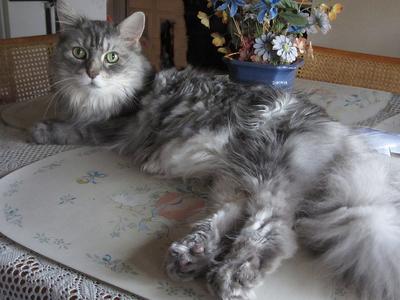 Yoshi
YoshiJan in Tuscon, Arizona shares Yoshi. He crossed over to Rainbow Bridge in December of 2016 at the young age of 18 and a half.
Unfortunately, he couldn't beat the brain tumor he developed. Despite his illness, Yoshi remained a sweet and well-behaved boy.
He was even smart - he understood a list of words! Whenever you asked if he wanted lunch, a treat, or anything, he'd give a quick, loud "mow" for a resounding "yes." Such a special boy.
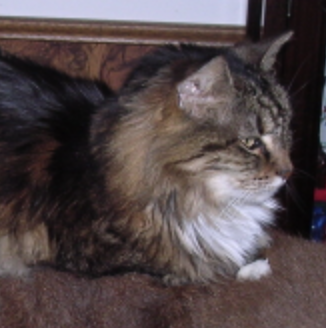
Anita and Dennis share Kato Lunt:
For 17.5 years, this angel protected and enriched their lives with her helpfulness and constant joy.
She lived each moment to the fullest and made the most of every day.
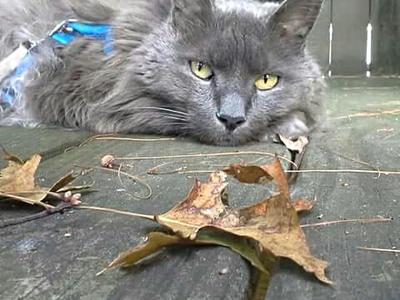
Jan in Cape Cod shares Smokey:
A beloved friend and companion for nearly twenty years, possessing a remarkably human-like personality. His spirit remains a strong presence in thier home and lives.
FAQ's (frequently asked questions):
Can a Maine Coon live for 20 years?
Can a Maine Coon live for 20 years?
Yes, they certainly can! Although the average life expectancy of Maine Coon Cats varies between 12-15 years, this accounts for premature death due to the dangers outdoors, as well as certain unexpected illnesses.
Many Coonie owners enjoy much longer lifespan than that with their beloved fur friends.
Do Maine Coons have health problems?
Do Maine Coons have health problems?
Any pet can have health problems. Three health conditions that can shorten a Maine Coon cat's lifespan are hypertrophic cardiomyopathy (HCM), spinal muscular atrophy (SMA) and Polycystic kidney disease (PKD).
However, it's important to note that responsible, ethical breeders conduct regular genetic testing on their breeding felines.
They do everything they can to ensure these conditions are not passed down to the kittens they sell.
Trustworthy breeders are transparent and will share the dates and results of the health and genetic screenings they have had done.
Do Maine Coons live longer than normal cats?
Do Maine Coons live longer than normal cats?
Domestic house cats, or "regular cats" have a life expectancy of 10-15 years on average, if kept as indoor kitties.
This is about the same as the average lifespan of Maine Coon cats.
If purchased through a responsible breeder who performs health screenings, you can expect many years of good health with your Coonie.
Even though there are no guarantees in life, the Maine Coon cat lifespan can be quite long. And that's a relief! With their amazing personalities, it's impossible not to fall completely in love with them.
Top of Maine Coon Cat Lifespan
« Back to Maine Coon Health
Recent Articles
-
Today's Features
Apr 16, 25 09:54 PM
Today we have two classic Memory Lane pages to share!
Murphy & Candy Cane: Double the Maine Coon Charm - This adorable Maine Coon duo from our 2011 Photo Albums - Murphy and Candy Cane - brought doubl… -
Memory Lane Month Begins!
Apr 15, 25 10:22 PM
We're thrilled to start our "Memory Lane Month" event by visiting some cherished moments from our community! We're in the process of restoring meaningful community stories like this one, to preserve t… -
Will a Maine Coon Protect Its Owner From Danger or an Intruder?
Apr 09, 25 10:41 PM
Plenty of people are curious: Will a Maine Coon protect its owner if something happens? Let’s talk about what this means, and what kind of protector a Coonie is.
